History of Feminism
Related: About this forumA 7-year-old girl responds to DC Comics’ sexed-up reboot of Starfire
Last edited Tue Oct 2, 2012, 11:20 AM - Edit history (1)

"Is this new Starfire someone you'd want to be when you grow up?"
*she gets uncomfortable again*"Not really. I mean, grown ups can wear what they want, but…she's not doing anything but wearing a tiny bikini to get attention."
"So, you know I'm going to put this on my blog right? (she nods) Is there anything else you want to say?"
"I want her to be a hero, fighting things and be strong and helping people."
"Why's that?"
"Because she's what inspires me to be good."
See, it's not about what they're wearing, though that can influence things. What makes a hero is WHO they are, the choices they make and the things they do. If my 7 year old can tell what you've done from looking at the pictures (there is no way I'm going to let her in on the whole emotionless random, amnesiac sex plot line) why can't you see the problem here?
If this is your attempt at being edgy and reaching out the huge female comic audience out here then I look forward to when this crap collapses around you so someone who gets it can take your place. We're looking for good stories and great heroes. This just isn't it.
the original:
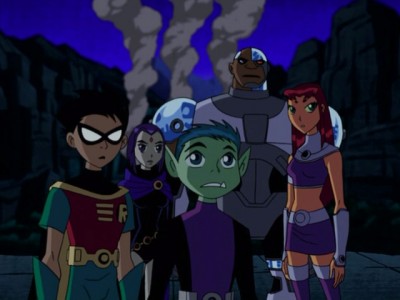

http://io9.com/5844355/a-7+year+old-girl-responds-to-dc-comics-sexed+up-reboot-of-starfire
Dyedinthewoolliberal
(15,577 posts)indicative of a comic book for children it is inappropriate. ![]()
seabeyond
(110,159 posts)one of the FEW newer cartoons that was allowed because it gave the very message the little girl is discussing. i was way particular what i fed my kids in media.
i am clueless why they would do this to this character. she was so awesome.
TlalocW
(15,383 posts)Was always busty and showed it off somewhat, but she still was innocently confused about more worldly ways when she first arrived on Earth and joined the Teen Titans, but at one time, she and Robin were in a relationship and sharing an apartment.
They made her more of a younger teenager in the cartoon and upped the innocence factor.
The new reboot of her is stupid though.
Also, the cartoon above is called, "Shortpacked." It's on my daily list of webcomics that I read. Apparently, they're bringing Lucy in as a regular character (that strip above is several years old). This one is recent.
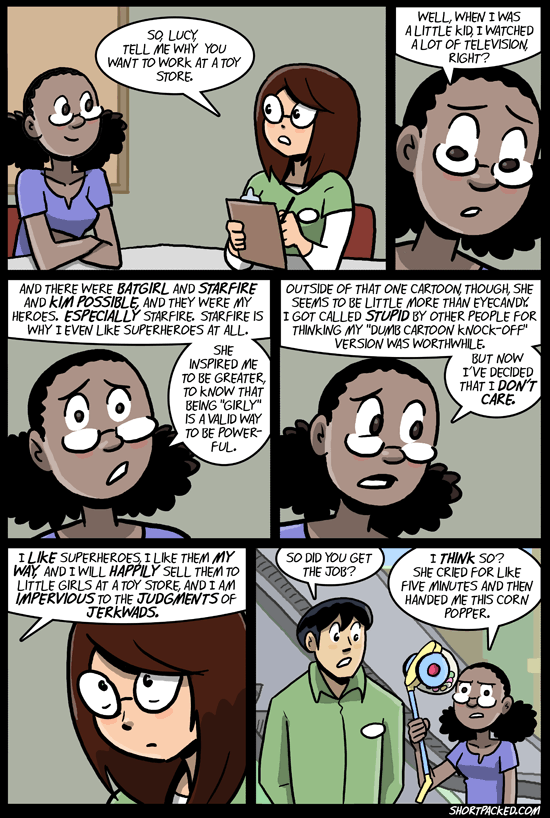
TlalocW
Shadowflash
(1,536 posts)The one listed above as 'Original' is actually the toned down revamp of the character for the kid's show.
When the character was introduced in 1980 she was scantily clad and pretty much the way they show her in the top picture.
Like it or not, good or bad, this article has the timeline backward and is disingenuous
Starfire circa 1980 --
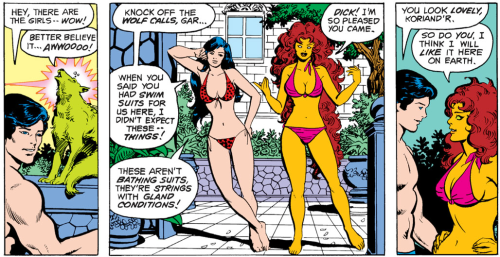

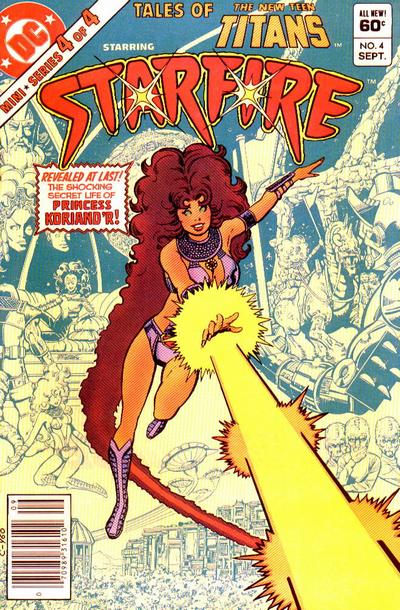
Grave Grumbler
(160 posts)This is the original version of Starfire (an adult), standing next to her boyfriend of the time, Nightwing (a grown-up Robin, the Boy Wonder):

Just in case there's any doubt about the nature of their relationship:
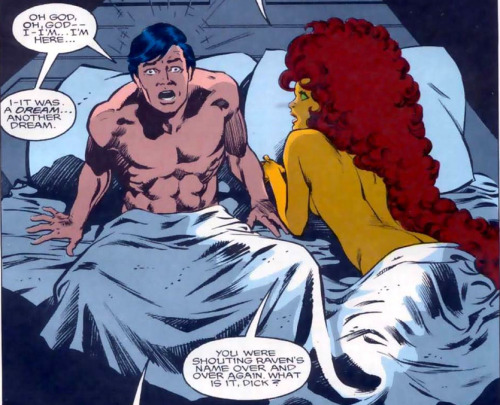
These images are from comics that are about 25 years old, BTW.
To speak of the tween version of Starfire (from the recent Teen Titans cartoon) as the "original" is completely wrong.
ismnotwasm
(41,988 posts)Not much has changed. Which is about what I'd expect in comic books.
I started reading certain graphic novel, popular ones like Sandman, Hellblazer and Preacher. The art for women in general is more realistic, except when trying to convey exceptional beauty. Then on males and females, there is the stylized body.
Here's an interesting article
A good example in comics is Emma Frost, best depicted in Astonishing X-Men. However, consider Frost’s tale and it becomes clear that the men are not chasing physical attractiveness but idealistic beauty. In the first issue, when both Wolverine and Cyclops fight over the deceased Jean Grey, Frost states, “superpowers, a scintillating wit and the best body money can buy…and I still rate below a corpse.” If we were to go the traditional anti-feminist route, the men would not respect a woman after death and would instead follow the most voluptuous. Yet, both men chase after the woman they fell in love with, who has an incredible hold on them, and ignore the physically attractive. The fact that both Jean Grey and Emma Frost are psychics with the ability to make others conform to their wishes, powers they more commonly use on men than women, further asserts that this is work in which men submit to women that stand for ideals beyond physical beauty, as Petrarch wrote about in his sonnets.
The second criticism is the characterization of female characters in comics. Critics love to argue that comics follow the traditional extremes of either portraying a damsel in distress or a femme fatale. However, if they were to actually study many of the prominent characters, they would see just how false this notion is. The best example to argue against such criticisms would be the role of Spider-Woman in Agent of S.W.O.R.D. In terms of portrayal, protagonist Jessica Drew neither dons the virtuous garb of the diminutive, shy lady in waiting nor the leather-clad battle armor of the fighting vixen. Instead, the protagonist spends much of the series in loose trench coats or wife beater shirts more suited to a cage fighter than an attractive woman. At numerous points, she is shown bloodied and beaten to an inch of her life. Certainly, the portrayal does not make her physically beautiful but there is an abstract allure. Also, in terms of characterization, she is neither entirely pure of heart nor is she the conniving type that so strangely fascinates men in power. Instead, she is a woman whose drive for revenge actually demonstrates deep-seated fears of loneliness and betrayal. Even the motion comic picks a voice actress whose take on the character is in no way sultry, yet it is strangely unique and filled with emotion. Therefore, it is safe to say that no traditional criticism of the unrealistic standards or insulting portrayal of women in comics applies to this character and she can therefore not be called a sexist caricature. Instead, she is an individual with so much depth beyond that material that she instead represents ideals. Plus, keep in mind that she also has the ability to control the men around her through pheromones she secretes from her body, once again demonstrating the Petrarchan desire for the female to rule the man who finds her beautifulThe first criticism made against comic books, possibly because it is the most blatant, is the portrayal of women. It is commonly believed that females in comic books are all depicted as incredibly attractive, with clothing and form that only men dream up, and demonstrate a fixation on physical attractiveness. Even if we overlook the fact a woman should not be treated as a blemish on womankind simply because of how she dresses, there is generally at least one person in everyone’s social circle so materialistically obsessed with their looks that everything from their clothing to their makeup is absolutely on target.
A good example in comics is Emma Frost, best depicted in Astonishing X-Men. However, consider Frost’s tale and it becomes clear that the men are not chasing physical attractiveness but idealistic beauty. In the first issue, when both Wolverine and Cyclops fight over the deceased Jean Grey, Frost states, “superpowers, a scintillating wit and the best body money can buy…and I still rate below a corpse.” If we were to go the traditional anti-feminist route, the men would not respect a woman after death and would instead follow the most voluptuous. Yet, both men chase after the woman they fell in love with, who has an incredible hold on them, and ignore the physically attractive. The fact that both Jean Grey and Emma Frost are psychics with the ability to make others conform to their wishes, powers they more commonly use on men than women, further asserts that this is work in which men submit to women that stand for ideals beyond physical beauty, as Petrarch wrote about in his sonnets.
The second criticism is the characterization of female characters in comics. Critics love to argue that comics follow the traditional extremes of either portraying a damsel in distress or a femme fatale. However, if they were to actually study many of the prominent characters, they would see just how false this notion is. The best example to argue against such criticisms would be the role of Spider-Woman in Agent of S.W.O.R.D. In terms of portrayal, protagonist Jessica Drew neither dons the virtuous garb of the diminutive, shy lady in waiting nor the leather-clad battle armor of the fighting vixen. Instead, the protagonist spends much of the series in loose trench coats or wife beater shirts more suited to a cage fighter than an attractive woman. At numerous points, she is shown bloodied and beaten to an inch of her life. Certainly, the portrayal does not make her physically beautiful but there is an abstract allure. Also, in terms of characterization, she is neither entirely pure of heart nor is she the conniving type that so strangely fascinates men in power. Instead, she is a woman whose drive for revenge actually demonstrates deep-seated fears of loneliness and betrayal. Even the motion comic picks a voice actress whose take on the character is in no way sultry, yet it is strangely unique and filled with emotion. Therefore, it is safe to say that no traditional criticism of the unrealistic standards or insulting portrayal of women in comics applies to this character and she can therefore not be called a sexist caricature. Instead, she is an individual with so much depth beyond that material that she instead represents ideals. Plus, keep in mind that she also has the ability to control the men around her through pheromones she secretes from her body, once again demonstrating the Petrarchan desire for the female to rule the man who finds her beautiful
bongbong
(5,436 posts)12 year old horndog boys buy comics in greater quantity than 7 year old girls.
![]()
Grave Grumbler
(160 posts)The vast majority of mainstream superhero comics of the type published by Marvel and DC are bought by men in their twenties and thirties.